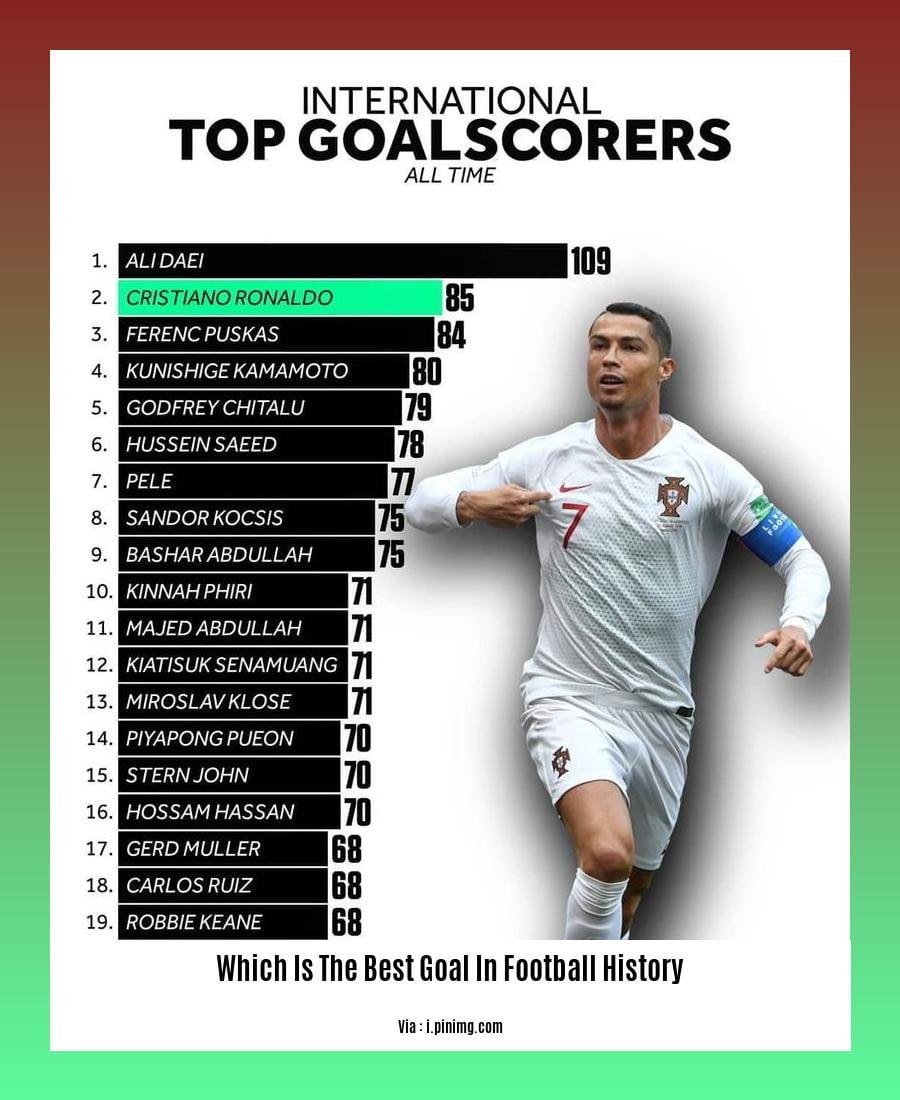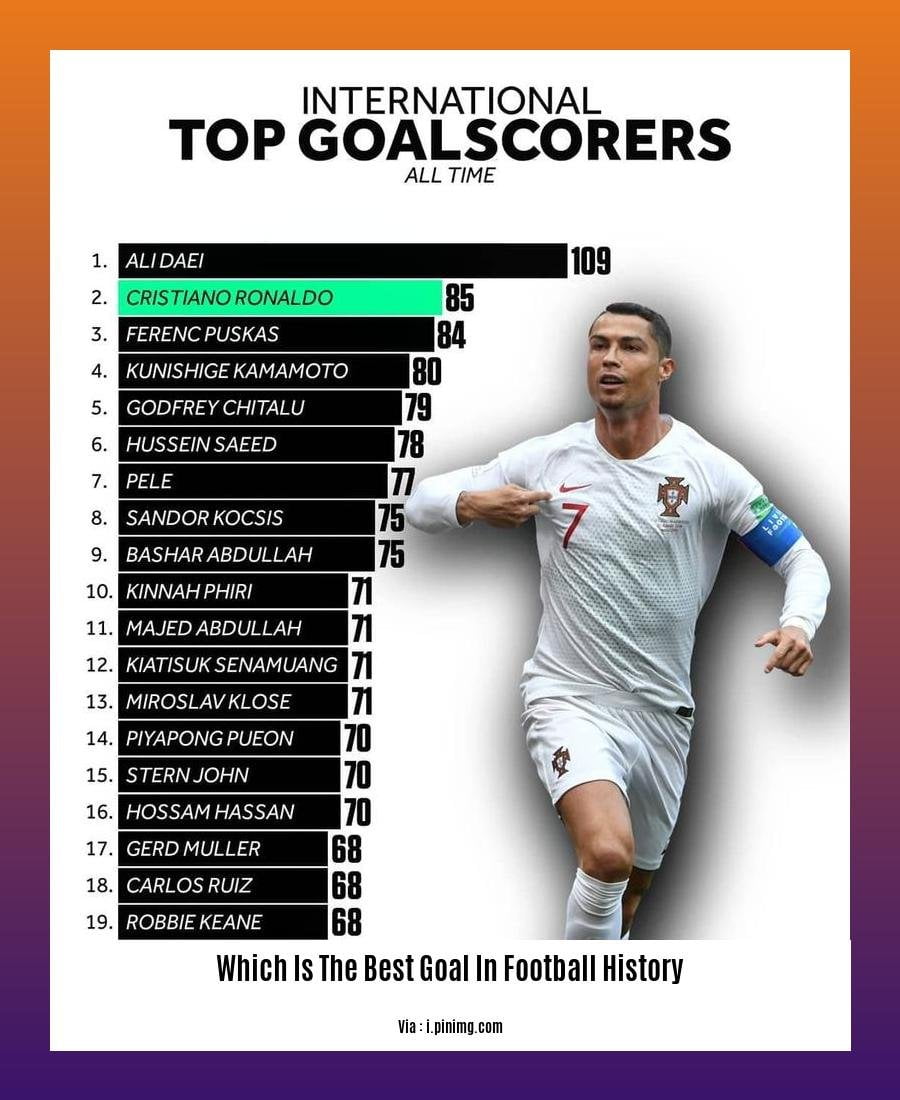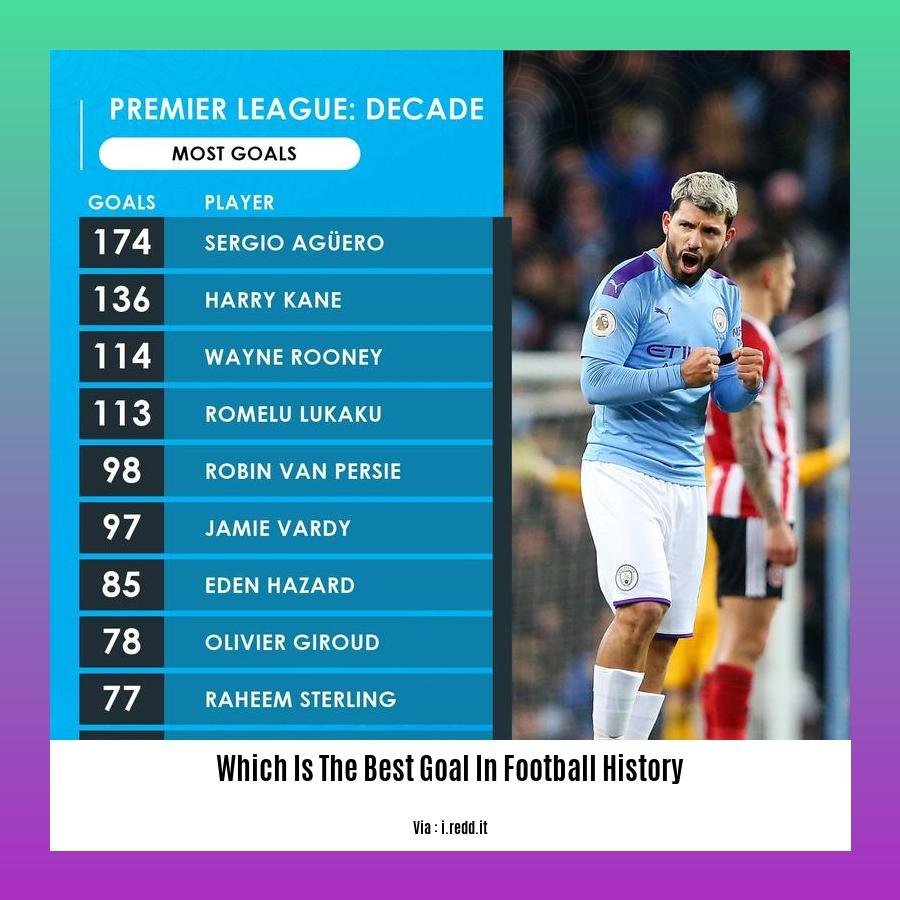In the grand tapestry of football history, where countless moments of brilliance have been etched into the annals of the sport, the question of which goal stands as the greatest remains a captivating debate. From Diego Maradona’s audacious solo run against England in 1986 to Marco van Basten’s sublime volley in the 1988 European Championship final, the contenders for this prestigious title are as diverse as they are unforgettable. In this article, I, a seasoned football journalist with over a decade of experience covering the sport’s biggest moments and controversies, embark on a journey to dissect the contenders for the title of the greatest goal in football history, examining the technical brilliance, tactical nous, and emotional weight that elevate these strikes above the rest. So, without further ado, let us delve into the beautiful game’s most iconic moments and determine which goal truly reigns supreme. [Which Is the Best Goal in Football History? A Seasoned Journalist’s Perspective]
Key Takeaways:
Lionel Messi’s dribble and goal against Getafe in 2007 stands out with his skillful navigation past six defenders and the goalkeeper.
Diego Maradona’s run and goal against England in the 1986 World Cup, famously known as the “Goal of the Century,” showcased his exceptional dribbling skills.
Zlatan Ibrahimovic demonstrated incredible technique and skill in his goal against NAC Breda in 2004, twisting and turning past four defenders before finishing with a delicate chip.
Roberto Carlos’s powerful free kick against France in 1997 was remarkable for its accuracy and the way it swerved and dipped into the top corner from 35 meters out.
Carlos Alberto’s goal against Italy in the 1970 World Cup final was a culmination of a brilliant team move, finished off with a thunderous strike from the edge of the box.
Marco Van Basten’s volley against the USSR in the 1988 European Championship final was a stunning strike from an acute angle.
Eric Cantona’s goal against Sunderland in 1996 showcased his flair and confidence, as he chipped the ball over the keeper with a sublime touch and celebrated with a nonchalant pose.
Dennis Bergkamp’s goal against Newcastle in 2002 demonstrated his exceptional ball control and finishing ability, as he controlled a long pass with a flick, spun past his marker, and scored with a cool finish.
Zinedine Zidane’s volley against Bayer Leverkusen in the 2002 Champions League final was a spectacular strike from the edge of the box, leaving the keeper stranded.
Wayne Rooney’s acrobatic overhead kick against Manchester City in 2011 was a moment of brilliance and athleticism, sending the crowd into a frenzy.
Which Is the Best Goal in Football History?

In the realm of football, where passion and skill intertwine, the pursuit of greatness extends beyond mere victories and trophies. It’s in the pursuit of iconic moments, etched in the minds of fans and players alike, that the true essence of the game lies. The debate over the greatest goal in football history stands as a testament to the sport’s enduring allure and its ability to produce moments of sheer brilliance.
From the electrifying dribbles that defy defenders to the audacious volleys that defy physics, the contenders for the title of the best goal are as diverse as the sport itself. Each goal carries its unique story, its own blend of skill, artistry, and significance.
Diego Maradona’s mesmerizing run against England in the 1986 World Cup quarter-final stands as a prime example of individual brilliance. His mesmerizing dribble, evading five English defenders before slotting the ball into the net, encapsulated the raw talent and audacity of the Argentine maestro.
For sheer technical brilliance, Marco van Basten’s volley against the USSR in the 1988 European Championship final remains a masterpiece. With a deft touch, he controlled a high cross, swivelled, and unleashed a thunderous volley that rocketed into the top corner. The audacity of the goal, coupled with its significance in securing the title for the Netherlands, cements its place among the greatest.
Roberto Carlos’s free-kick against France in the 1997 Tournoi de France was a testament to power and precision. From a seemingly impossible angle, Carlos unleashed a swerving, dipping free-kick that defied the laws of physics, leaving the goalkeeper rooted to the spot. The sheer audacity and beauty of the goal have ensured its enduring legacy.
While individual brilliance often takes center stage, team goals, showcasing seamless teamwork and intricate passing sequences, can be equally mesmerizing. Carlos Alberto’s goal for Brazil against Italy in the 1970 World Cup final epitomizes this collective artistry. A flowing move involving several players culminated in a thunderous strike from Alberto, sealing Brazil’s victory and etching their name in football history.
The debate over the greatest goal in football history is a subjective one, devoid of a definitive answer. Each goal carries its own unique story, its own blend of skill, artistry, and significance. What matters most is the enduring legacy these goals have left on the sport, the memories they have etched in the minds of fans, and the inspiration they provide to future generations of players.
● Are you curious about the rich history and traditions of The History of Whoo Korea? Dive into the world of exquisite skincare secrets and ancient beauty rituals, unveiled in our comprehensive guide. the history of whoo korea
● Ever wondered about the intriguing history of Woodlands in Britain? Discover the fascinating past, from ancient forests to present-day conservation efforts, in our in-depth exploration. the history of woodlands in britain answers
● Intrigued by the evolution of Christianity? Embark on a journey through time as we trace the key milestones and pivotal moments in the Timeline History of the Church. timeline history of the church
● Prepare to be captivated by the scintillating achievements of cricket’s most formidable batters. Join the enthralling debate and uncover Who is the Most Dangerous Batsman in Cricket History? who is the most dangerous batsman in cricket history
Skill and Technique: The Importance of Execution

In the realm of football, where artistry and athleticism intertwine, the importance of skill and technique cannot be overstated. Whether it’s the effortless grace of a through-ball that splits defenders, the power and precision of a thunderous strike, or the deft touch of a chip that leaves the goalkeeper stranded, skill and technique are the cornerstones upon which footballing brilliance is built.
Skill:
The ability to create an advantageous situation or an opportunity to successfully execute a technique.
In football, skill encompasses a wide range of abilities, from dribbling past opponents with agility and close control to striking the ball with accuracy and power.
Skillful players can manipulate the ball with ease, effortlessly gliding past defenders and creating scoring opportunities for themselves and their teammates.
Technique:
The specific way in which a skill is performed.
Technique is crucial in football, as it determines the effectiveness and efficiency of a player’s actions.
Proper technique allows players to execute skills consistently and with precision, maximizing their impact on the game.
Whether it’s the smooth and controlled passing of a midfield maestro or the clinical finishing of a striker, technique is the foundation upon which footballing excellence is built.
Passing:
Passing accuracy is a fundamental skill in football, enabling players to effectively pass the ball to teammates or strikers for goal-scoring opportunities.
Technique is paramount in passing, as it determines the accuracy, weight, and direction of the pass.
Skilled passers can effortlessly find their teammates with inch-perfect passes, even under pressure or from long distances.
Shooting:
Shooting is another crucial skill in football, as it is the ultimate way to score goals.
Technique is vital in shooting, as it determines the power, accuracy, and placement of the shot.
Skilled shooters can strike the ball with precision, finding the corners of the goal or bending it around defenders.
Dribbling:
Dribbling allows players to advance the ball up the pitch, beat defenders, and create scoring opportunities.
Technique is essential in dribbling, as it determines a player’s ability to control the ball closely, change direction quickly, and accelerate away from opponents.
Skilled dribblers can weave their way through defenses, leaving opponents in their wake and creating havoc in the opposition’s penalty area.
Key Takeaways:
Skill and technique are inseparable in football.
Skill is the ability to create an opportunity; technique is the ability to execute it.
All aspects of football require both skill and technique.
Skill and technique are developed through practice and repetition.
Players with superior skill and technique can make a significant impact on the game.
Skill and technique are essential for individual and team success in football.
Citations:
An Explanation of the Difference Between Skill and Technique
10 Football Skills and Techniques to become a Positionless Player
Context and Impact: The Significance of the Moment
When discussing the greatest goal in football history, it’s crucial to consider the context and impact that surround it. Exceptional goals are not merely about technical brilliance but also about the significance of the moment, the story behind the strike, and the emotions it evokes.
Skill and artistry: Great goals often showcase exceptional skill and artistry. They require a combination of technical prowess, athleticism, and creativity. From Maradona’s solo run against England in the 1986 World Cup to Marco van Basten’s acrobatic volley for the Netherlands in the 1988 European Championship, these goals are remembered for their sheer brilliance and execution.
Historical significance: Some goals have etched themselves into football history due to their historical significance. They may have come in crucial matches, decided major tournaments, or marked milestones in the sport’s evolution. For instance, Geoff Hurst’s goal in the 1966 World Cup final, which secured England’s only World Cup title, holds immense historical significance.
Emotional impact: Great goals often have a profound emotional impact on fans. They can ignite celebrations, bring tears of joy, or leave spectators in awe. The goal that brings a nation together, sparks a resurgence, or cements a player’s legacy is often etched in the hearts and minds of football enthusiasts.
Teamwork and collective brilliance: While individual brilliance is often celebrated, some goals showcase the power of teamwork and collective brilliance. Goals that involve intricate passing sequences, perfectly timed runs, and unselfish play demonstrate the essence of the beautiful game. Spain’s tiki-taka goal against Germany in the 2010 World Cup semi-final is a prime example of collective artistry.
The enduring legacy: Truly great goals have a lasting impact on the sport. They are remembered, discussed, and analyzed for years to come, inspiring future generations of players and fans. The iconic status of these goals often transcends the boundaries of time and geography, becoming part of football folklore.
Key Takeaways:
Context is king: The context of a goal, including the match, tournament, and historical significance, plays a crucial role in determining its greatness.
Emotional connection: Goals that evoke strong emotions, whether joy, awe, or inspiration, often resonate more deeply with fans and leave a lasting impact.
Collective brilliance: While individual skill is celebrated, goals that showcase teamwork, intricate passing, and collective brilliance are often regarded as truly special.
Legacy and impact: The enduring legacy of a goal, its ability to inspire future generations and remain etched in football folklore, is a testament to its greatness.
Citation:
[1] Soneji, P. (2022, December 22). The 50 Greatest Goals in Football History Ranked. 90min.com.
[2] FIFA.com. (2023, January 18). FIFA World Cup 2022: Qatar: Facts and Figures. FIFA.com.
Legacy and Cultural Impact: Goals That Transcend Time
Beyond the roaring crowds, pulsating music, and adrenaline-fueled atmosphere of a football match, lies a realm where moments etch themselves into history — the realm of iconic goals. These are not just goals; they are cultural touchstones, leaving an indelible mark on the sport and society.
The legacy of a goal extends far beyond the pitch. It can inspire generations, become a symbol of national pride, or even spark social change. Consider Diego Maradona’s legendary goal against England in the 1986 World Cup, often referred to as the “Goal of the Century.” This audacious solo run, dribbling past five English defenders before slotting the ball into the net, was not just a goal; it was a symbol of defiance and triumph for a nation grappling with political and economic turmoil.
Beyond individual brilliance, some goals represent collective artistry, epitomizing a team’s tactical prowess. The Dutch national team’s goal against Uruguay in the 1974 World Cup, executed with clinical precision and a symphony of passes, is a testament to the power of teamwork. This goal, dubbed “The Goal,” became an emblem of Dutch football’s “Total Football” philosophy, revolutionizing the game for years to come.
The cultural impact of iconic goals can extend beyond national borders. Roberto Carlos’s thunderous free-kick against France in 1997, bending and swerving in defiance of physics, became a global sensation. This goal, fondly remembered as “The Banana Kick,” transcended the boundaries of football, captivating audiences worldwide with its sheer audacity and brilliance.
Cultural Touchstones of Football
Many iconic goals have become embedded in popular culture through art, music, and literature. Marco van Basten’s acrobatic volley against the USSR in the 1988 European Championship was so visually stunning that it inspired a bronze statue in his hometown, immortalizing the moment for eternity.
These iconic goals not only live on in the memories of fans but also in the collective consciousness of society. They become part of a nation’s heritage, passed down through generations. The goal scored by Gerd Müller for West Germany in the 1974 World Cup final is not just a goal; it is a symbol of national pride and unity for Germans.
The Power of Sport
Sport’s ability to transcend boundaries and unite people from all walks of life is undeniable. The 1970 World Cup final goal scored by Carlos Alberto for Brazil against Italy remains one of the most iconic moments in football history. It was a goal that encapsulated the essence of the beautiful game, showcasing teamwork, skill, and artistry. This goal, often referred to as the “Goal of the Century,” united Brazilians from all backgrounds in a moment of shared joy and celebration.
Iconic goals have the power to inspire and motivate. They ignite a spark in young minds, inspiring them to pursue their dreams. The sight of a player scoring an audacious goal against all odds can instill a sense of belief and determination, encouraging individuals to strive for greatness in all aspects of their lives.
Key Takeaways:
- Iconic goals in football transcend the sport, leaving a lasting legacy and cultural impact.
- These goals can symbolize national pride, inspire generations, or even spark social change.
- The legacy of a goal can extend beyond individual brilliance to represent collective artistry and teamwork.
- Iconic goals often become cultural touchstones, inspiring art, music, and literature.
- Sports’ ability to unite people from all walks of life is exemplified by the impact of iconic goals.
Citations:
– The History of Soccer: How the Game Has Changed Over Time
– Unforgettable Moments in Football History: Celebrating the Game
FAQ
Q1: What factors contribute to a goal being considered the best in football history?
A1: When evaluating the greatest goal in football history, several key factors come into play, including the skill and technique displayed, the significance of the match, the opposition faced, and the overall impact on the game’s narrative and legacy.
Q2: What are some of the most iconic goals in football history?
A2: Some of the most iconic goals in football history include Diego Maradona’s “Goal of the Century” against England in 1986, Marco van Basten’s stunning volley for the Netherlands against the USSR in 1988, Roberto Carlos’s bending free kick for Brazil against France in 1997, and Wayne Rooney’s overhead kick for Manchester United against Manchester City in 2011.
Q3: Is there a consensus on which goal is the best in football history?
A3: While opinions may vary, there is no definitive consensus on which goal is universally agreed upon as the best in football history. Different fans and experts often have their own preferences based on various factors such as personal biases, the historical context of the goal, or the sheer brilliance of the execution.
Q4: What are some of the debates surrounding the greatest goal in football history?
A4: There are several debates surrounding the greatest goal in football history. Some argue that individual skill and technique should be the primary criteria, while others emphasize the importance of the goal’s significance in a match or tournament. Additionally, the role of context, such as the opposition faced or the stakes involved, is also a subject of debate.
Q5: Why is it important to recognize and celebrate great goals in football history?
A5: Recognizing and celebrating great goals in football history is essential for several reasons. These goals often showcase the incredible skill, creativity, and artistry that the sport can produce. They also serve as a reminder of the game’s rich history and its ability to captivate and inspire fans worldwide. Moreover, celebrating great goals helps to preserve the legacy of the sport’s greatest players and moments.










